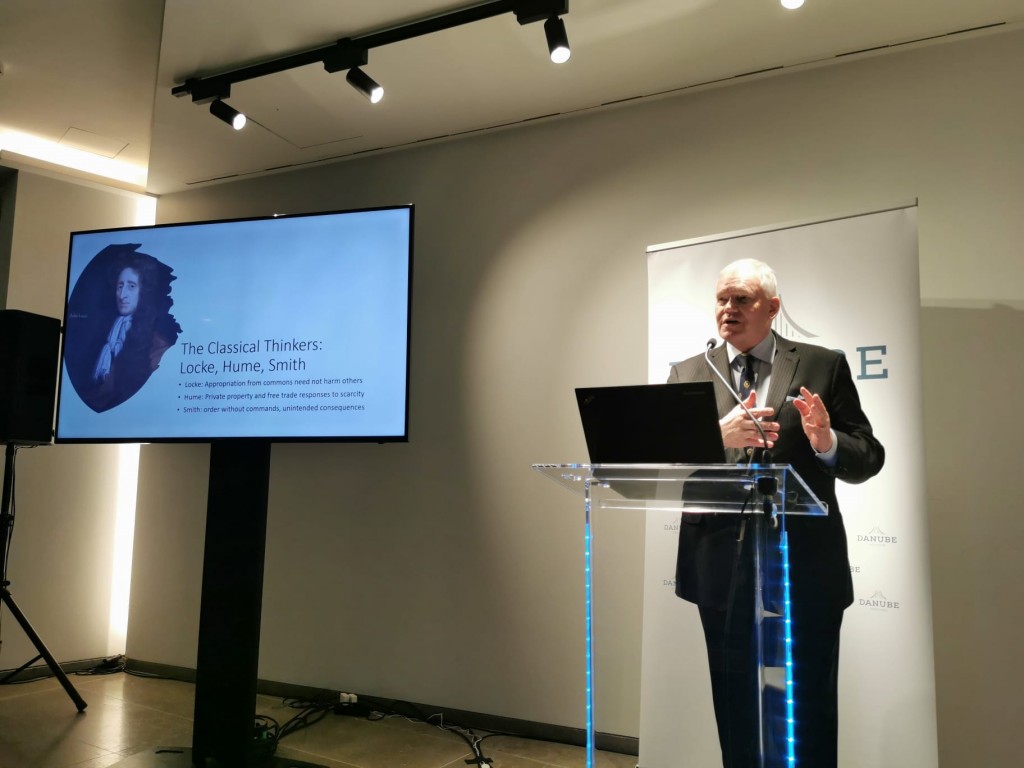 RNH Academic Director Professor Hannes H. Gissurarson presented his recent book in two volumes, Twenty-Four Conservative-Liberal Thinkers, on 8 November 2021 in Budapest, at a seminar organised by the Danube Institute, led by John O’Sullivan. In his introductory talk, Gissurarson said that he regarded John Locke, David Hume, and Adam Smith as the founding fathers of the conservative-liberal tradition with their defence of commercial society, spontaneously developed and based on free trade and private property. However, conservative liberalism as a separate tradition was only clearly articulated with the negative response to the French Revolution by Edmund Burke, Benjamin Constant, and Alexis de Tocqueville. The British Revolution of 1688 and the American Revolution of 1776 were made to preserve and expand existing liberties, whereas the French Revolution of 1789 and, much later, the Russian Revolution of 1917, were attempts to reconstruct society according to the ideas of Rousseau and Marx, respectively. Such attempts were bound to fail, as Ludwig von Mises and Friedrich von Hayek cogently argued.
RNH Academic Director Professor Hannes H. Gissurarson presented his recent book in two volumes, Twenty-Four Conservative-Liberal Thinkers, on 8 November 2021 in Budapest, at a seminar organised by the Danube Institute, led by John O’Sullivan. In his introductory talk, Gissurarson said that he regarded John Locke, David Hume, and Adam Smith as the founding fathers of the conservative-liberal tradition with their defence of commercial society, spontaneously developed and based on free trade and private property. However, conservative liberalism as a separate tradition was only clearly articulated with the negative response to the French Revolution by Edmund Burke, Benjamin Constant, and Alexis de Tocqueville. The British Revolution of 1688 and the American Revolution of 1776 were made to preserve and expand existing liberties, whereas the French Revolution of 1789 and, much later, the Russian Revolution of 1917, were attempts to reconstruct society according to the ideas of Rousseau and Marx, respectively. Such attempts were bound to fail, as Ludwig von Mises and Friedrich von Hayek cogently argued.
Gissurarson said that perhaps Hayek was the most distinguished modern representative of the conservative-liberal tradition. His theory of spontaneous order described how coordination without commands was possible and indeed indispensable, utilising both the price mechanism and time-tested practices. Another intriguing conservative-liberal thinker was Michael Oakeshott who argued that modern man had acquired the will and the ability to make choices and that accordingly the society fit for modern man was that in which government only enforced general rules enabling different individuals to live peacefully together.
Professor Ferenc Hörcher and Dr. David L. Dusenbury commented on Gissurarson’s presentation. They both criticised it from a conservative point of view, although they supported the suggestion that conservatives and liberals should stand united against socialism. It seemed to Hörcher that Gissurarson was really presenting classical liberalism rather than any kind of conservatism. What was lacking in classical liberalism was however a sense of community, an awareness of the many ties and commitments people had by virtue of their identity rather than their choices. In response, Gissurarson pointed out that especially Burke and Tocqueville were very much aware and in favour of such ties and commitments: they envisaged a vibrant civil society, not only an almighty state confronting separate and therefore powerless individuals. It was true, Gissurarson conceded, that commercial society destroyed or at least challenged some traditional communities, but at the same time it facilitated the formation of new communities. The best example was the family: there comes a day when you leave your old family and form a new one. Even in what appears to be a concrete, heartless jungle, for example New York City, there are many active communities, spontaneously formed, although not always visible at first sight.


